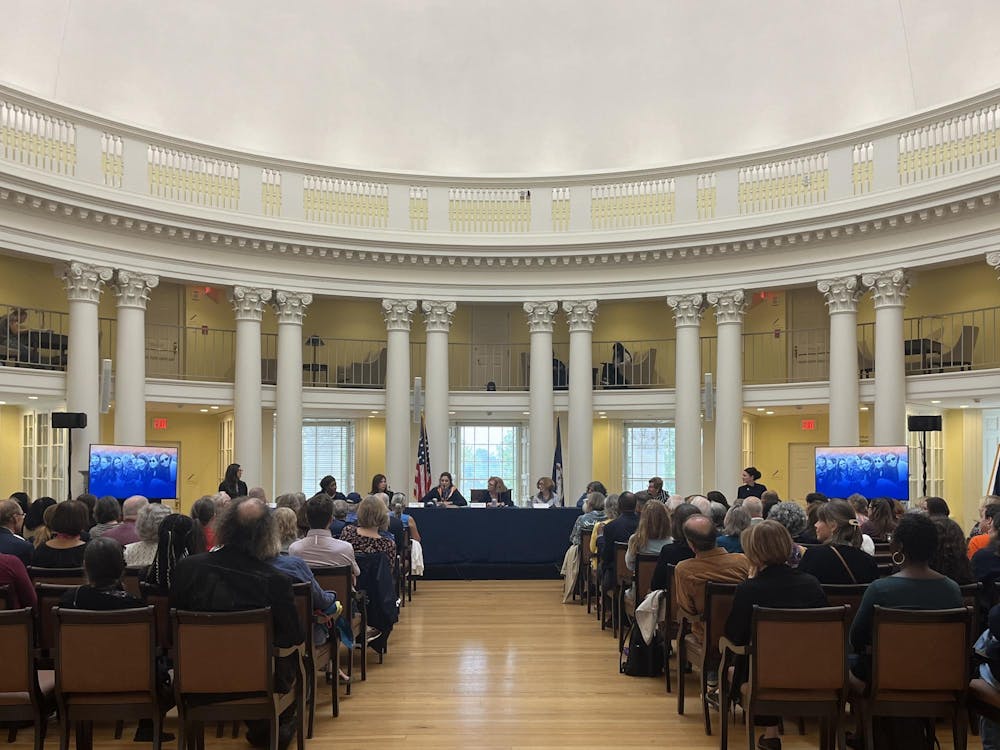Fifteen women from the Class of 1974 — the University’s first fully coeducated class — discussed their personal stories in the College of Arts and Sciences Wednesday and Thursday at the Spirit of 1974 Symposium. Hosted by the Alumni Association, the event marked the class’s 50th anniversary and paid tribute to the alumni’s hardships, achievements and trailblazing efforts to carve a place for female students on Grounds.
At Wednesday’s event, seven women from the Class of 1974 spoke in the Rotunda Dome Room before an audience of students, faculty and alumni. Ernest Ern, the former dean of admissions who selected the inaugural cohort of women, was also in attendance. The event kicked off with a performance from the Virginia Women’s Chorus and concluded with the unveiling of a portrait of 140 women from the Class of 1974, which will hang in the Edgar Shannon Library. Thursday’s event featured a similar panel in Alumni Hall, with eight different women sharing their stories and answering questions from the crowd.
Before 1970, women had earned graduate and professional degrees at the University, including those in law, medicine, nursing and education, but the University still lacked a standard undergraduate admissions process for women to apply to the College. Following a class-action lawsuit in 1969, the Board of Visitors replaced its original plan — to gradually admit women into all of the University’s schools across 10 years — with a plan to enroll women over two years.
In 1970, the University admitted 350 first-year women and 100 female transfer students to the College, becoming the last public university in the United States to go fully coeducational. By 1972, it had adopted a gender-neutral admissions process.
With one female student for every 22 male students in 1970, many panelists recalled challenges they faced on Grounds, from student organizations barring their entry to leftover urinals in their bathrooms — the latter in which they ended up planting flowers. Class of 1974 alumna Betty Shotton recalled how she and her female peers leaned on each other for support, finding strength in their collective presence.
“We had to create the experience of coeducation. Nothing was given to us, no support systems, no orientation, no guidance counseling,” Shotton said. “There wasn't anybody really to turn to — except for each other.”
For Class of 1974 alumna Patty Fralix, this sort of change defined her time on Grounds. As the University adjusted to the presence of female students, Fralix said she, in turn, sought to rapidly adapt to a male-dominated environment. She explained how she and her peers became the first female students to join and take on leadership positions in several student organizations, fighting to prove that they belonged at the University.
“Being a part of the first class of women at U.Va. was all about change — it taught me how to deal with change and deal with barriers,” Fralix said.
Additionally, many women mentioned how the strength they gained on Grounds stayed with them after graduation. Class of 1974 alumna Claudia Russell said being singled out in her classes shaped the way she later carried herself during her career in architecture.
“I was self-conscious being one of the few women in any of my classes,” Russell said. “Ultimately, even though it was hard [to navigate], it really helped me. It also whetted my appetite to learn as much as I could, so I could fight back.”
Turning her attention to the current students in the audience, Class of 1974 alumna Debbie Denno emphasized the importance of building one’s support system on Grounds. Denno said finding people who would champion her through the hardships was just as vital to her University experience as finding her own purpose in college.
“When we got here, we had to move very quickly and follow whatever purpose we had in mind and just plow through,” Denno said. “If you have that kind of purpose — whatever it may be — stick to that … and have people support you that way because they will get you through.”
Denno’s advice struck a chord with many students, who were inspired by the resilience of the Class of 1974. Second-year College student Saya Nylin expressed her admiration for the incredible impact the women before her had on the University.
“Sometimes I do take for granted that I get to go here and that it's a fully coeducational school,” Nylin said. “This wouldn't have happened without this class of women who were inspired to come here and create change for the rest of us.”
Shotton acknowledged difficulties that current students face today. According to her, the University has continued to weather challenges because its community members hold fast to the institution's core values.
“There are a lot of issues at the University today — not the same as what we had, but equally as challenging. And throughout all these hundreds of years, the University of Virginia has persisted because it has stayed the course of what it stands for — educational excellence, integrity, honesty, resilience, self-governance — and it encourages students to hold on to those values,” Shotton said. “Because of that, it has survived.”
Across both days of the symposium, the 15 women left attendees with an inspiring image of overcoming adversity. Shotton said the Class of 1974 represents the University’s ability to adapt to challenges across generations.
“Our role in this long legacy of the University of Virginia is as an example of how change can happen, how remarkably resilient and flexible this University can be, how it can adapt and go from being an all-white, male, preppy university into a fully coeducational, equal-gendered University in a matter of years,” Shotton said. “That is the great lesson for the University of Virginia.”







